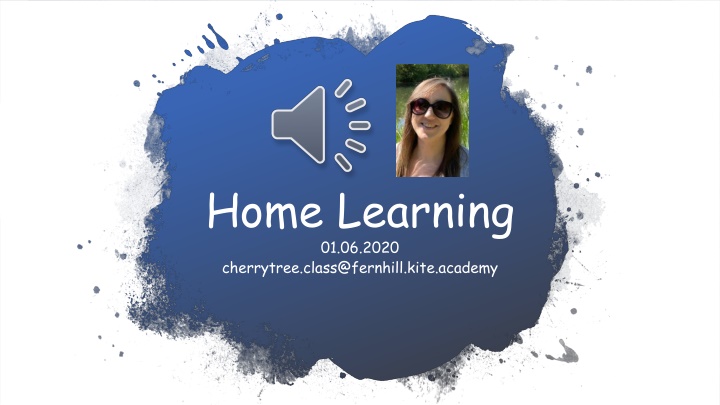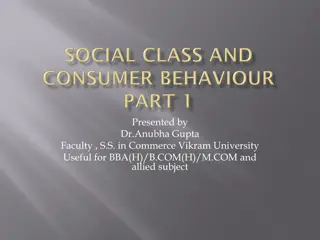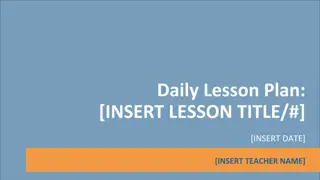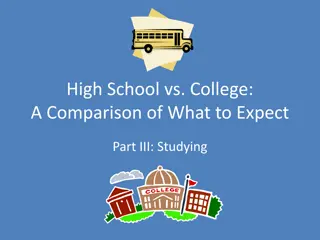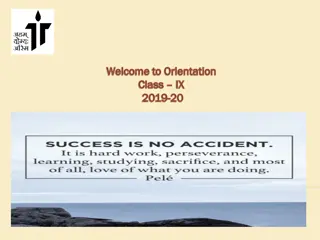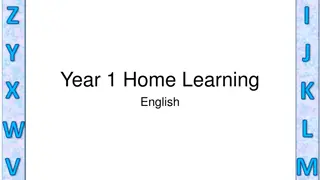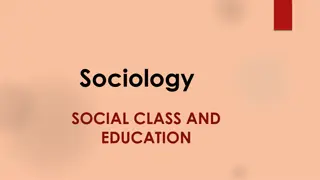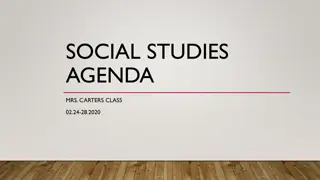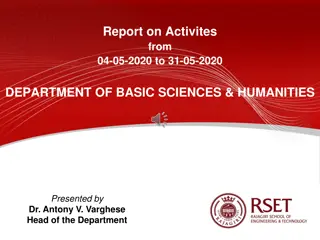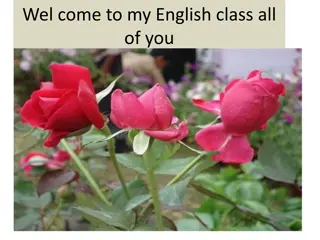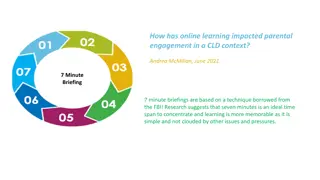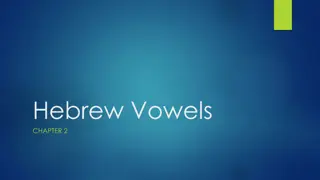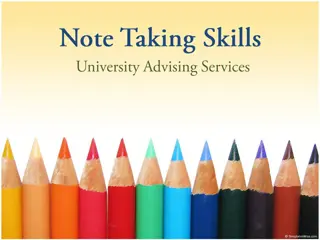Cherrytree Class Home Learning Activities - 01/06/2020
Engage in daily Maths investigations, English activities, and Handwriting practice themed around Fairy Tales. Explore reading, spelling challenges, and word types while enhancing handwriting skills. This week's focus is on letter formation and cursive handwriting. Join the learning adventure at Fernhill Kite Academy!
Download Presentation

Please find below an Image/Link to download the presentation.
The content on the website is provided AS IS for your information and personal use only. It may not be sold, licensed, or shared on other websites without obtaining consent from the author.If you encounter any issues during the download, it is possible that the publisher has removed the file from their server.
You are allowed to download the files provided on this website for personal or commercial use, subject to the condition that they are used lawfully. All files are the property of their respective owners.
The content on the website is provided AS IS for your information and personal use only. It may not be sold, licensed, or shared on other websites without obtaining consent from the author.
E N D
Presentation Transcript
Home Learning 01.06.2020 cherrytree.class@fernhill.kite.academy
Complete the daily Maths investigations and challenges. Complete the daily English activity Don t forget to play Times Tables Rockstars throughout the week How it works Spelling challenge question for each day Read every day. Practise reading aloud, and in your head. The Topic for this week is Fairy Tales. Please see the website for the list of activities.
Overview of English: Reading Enjoy reading a book.
Handwriting It s important to keep practising your handwriting it s a muscle like any other and needs to be exercised! We Ate All the Cheetos We ate all the Cheetos and all the Doritos and all of the chocolates and cheese. We still have some greens and a can of sardines and some pickles and parsnips and peas. We swallowed the sweets, all the puddings and treats, and we finished the ice cream and jam. What s left is a trout and a jarful of kraut and what looks like a turnip or yam. We drank all the shakes and we ate all the cakes and the pies and the fries and the custard. And yet there s a lime and a few sprigs of thyme and a half empty bottle of mustard. It seems we were hasty in eating the tastiest snacks we had purchased before. Now all that s on hand is the food we can t stand. We might have to go to the store. Kenn Nesbitt This week we will focus on the letter formation: Watch the video then practice one line of this https://www.teachhandwriting.co.uk/cursive- joins-choice-2.html Then practice your cursive (joined up) handwriting by copying out the poem. https://www.poetry4kids.com/poems/we-ate-all-the-cheetos/
Monday Week 10 You don t need to print these daily spelling mats, you can just copy from the screen.
Can you spell the days of the week? Check your answers on the next slide
Monday Tuesday Wednesday Thursday Friday Saturday Sunday Did you remember your capital letters?
Todays activity uses different word types. Use this information to remind you of different word types
Verbal activity. This story has missing words. Look at the word type in brackets under each missing word. Can you fill it with your own word. Read the story out loud with your chosen words. Does it make sense?
1. 2. 3. 4. 5. 6. 7. 8. 9. 10. Adjective 11. Place 12. Animals 13. Animals 14. Verb-ing 15. Noun 16. Adjective 17. Nouns 18. Adjective 19. Food 20. Adjective 21. Nouns 22. Nouns Place Verb-ed Vehicle Number Nouns Animals Verb-ing Noun Vehicle On the next slide is another story with missing words. This time I am not going to show you the story until after you have chosen your words. On a scrap of paper or in your book write an example of each word in this order:
Now put your chosen words in to the story. Read it aloud does it makes sense?
Would you like to write your own short story with missing words for your friends to complete? (Email it to your class teacher and we will share some in the following weeks) Remember to give the word type under each missing word! If you would like to do more of these click on the link for an online game (check with an adult first) https://www.glowwordbooks.com/blog/category/kids-online-mad-libs/
Three money questions today children may need a hand!
Tuesday You don t need to print these daily spelling mats, you can just copy from the screen.
Can you write the first 6 months of the year? You will be able to check your answer on the next slide
Did you remember your capital letters? January February March April May June
Today you are going to write some quiz questions for your friends. First complete the following quiz to give you of some ideas about how you might present your questions. Then chose a subject you have enjoyed learning about in Year 4, 5 or 6. Write up to 5 questions for your friends. We will choose as many as possible to send out in a quiz next week! You may need to research your topic. (Ask an adult for help) You will also need to find the answers to your questions. Finally ask an adult to email your questions and answers to your class teacher.
Which sport is played at Queens and Wimbledon? Q A Tennis Next Answer Next
Which of these is NOT a swimming stroke: caterpillar or butterfly? Q A Caterpillar Next Answer Next
The Canadian flag is red and white and has a picture of what kind of leaf in the centre? Q A Maple Next Answer Next
Where would you find a rook, a bishop and a pawn? Q A Chess Next Answer Next
What kind of car does Mr Bean drive? Q A A green Mini Next Answer Next
Does cotton come from a plant, animal or mineral? Q A A plant Next Answer Next
True or false: the slime eel is the only fish that can sneeze? Q A True! Next Answer Next
What is the biggest planet in the solar system? Q A Jupiter Next Answer Next
Finish the tongue twister: She sells seashells on the ...? Q A Seashore Next Answer Next
Q What colour is an aubergine? A Dark purple Next Answer Next
Now its your turn to write some quiz questions for your friends. First complete the following quiz to give you of some ideas about how you might present your questions. Then chose a subject you have enjoyed learning about in Year 4, 5 or 6. Write up to 5 questions for your friends. We will choose as many as possible to send out in a quiz next week! You may need to research your topic. (Ask an adult for help) You will also need to find the answers to your questions. Finally ask an adult to email your questions and answers to your class teacher.
The answer is one of the numbers in red! Marvellous Me badges for those who email me the answer!!
Wednesday You don t need to print these daily spelling mats, you can just copy from the screen.
Can you spell the last 6 months of the year? You can check your spellings on the next slide.
July August September October November December Did you remember your capital letters?
Today, tomorrow and Friday we are going to focus on writing a newspaper report. Think about a fairy-tale that you know and decide how you would report the story to someone else. You could listen to The 3 Little Pig here if you need inspiration https://www.bbc.co.uk/cbeebies/radio/the- three-little-pigs?collection=cbeebies-on-stage You may choose to write your report about the whole story or focus on one part For example, if you were looking at the 3 Little Pigs you may include all the houses that get blown down or just choose to report on one house. TODAY: Look through the following slides to help you decide how you will organise your report. You may want to write a few notes to help you remember. Thursday we will focus on planning our report.
Work through the next slides, thinking about how you will use this information to report the main events of your chosen fairy tale. Make notes to help you plan your report tomorrow.
Headline Headline and byline For a good headline, you need to: Catch the reader s attention so they want to read the rest of the report; Sum up the story in a few words; Use powerful and interesting language; Write in the present tense even if the report is about an event that has already happened; Include alliteration or wit at times. Lead Body Tail
Byline Headline and byline Lead For a good byline, you need: The writer s name; The writer s speciality (for example, Sports reporter, Food correspondent, Crime editor, Deputy politic editor, Senior fashion reporter); A link to the writer s Twitter account (for example, @dgoodman). Body Tail
Lead Headline and byline For a good lead paragraph, you need to; Make the paragraph short and snappy so that it briefly explains what has happened; Ensure that, even if the reader stopped reading at this point, they would still know roughly what happened; Use past tense in most cases; Make sure the first paragraph answers as many of these six questions as you can Who? What? Where? Why? When? How? Lead Body Tail
Body For a good body section, you need to: Add more information and detail to your lead paragraph; Include background information, evidence, facts and quotes from people involved in or connected to the event/story; Continue to write in order of importance, putting the most important information in the first few paragraphs of the body section. Headline and byline Lead Body Having quotes from witnesses or experts will make your report more credible and interesting. Tail Be sure to use correct punctuation for quotes!
Tail For a good tail section: Give the reader the opportunity to gain additional information if they are particularly interested in the topic of the news report; Include links to previous news reports or useful websites; Include a final quote from a witness or expert that helps to sum up the story or that could hint at what might happen next. Headline and byline Lead Body This Tail information can be useful but is not always needed. It tends to be the least important information in the report. Tail
Get It Right! For a GREAT newspaper report you need to: Cut out the less important sections from the bottom of the report if it ends up being too long; Keep your most important information near the top of the report; Keep your sentences short and punchy, so that the report is interesting to your reader; Check your spelling and your facts and check them again!
HINT Think and challenge yourself to any times table or division where the answer is eight? Then do the same for your age?
Thursday You don t need to print these daily spelling mats, you can just copy from the screen.
There are 4 seasons in a year, can you spell them? You can check your answers on the next slide
